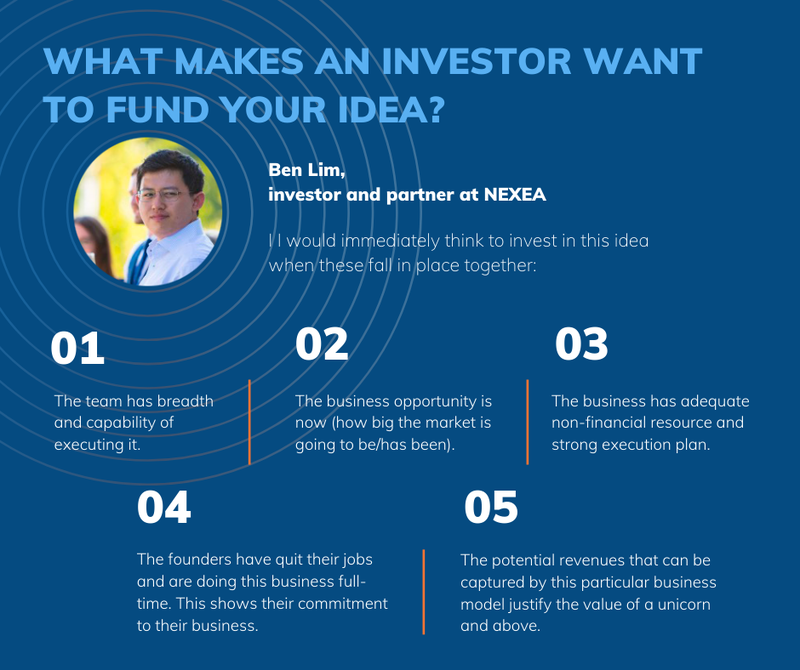
GLOBAL • INVESTMENT
Seedstars Global
AUG. 18, 2020
What do investors expect from your pitch? What if you don’t have traction? How important are your presenting skills? Is ‘fake it till you make it’ worth trying? What are the common mistakes to avoid while pitching your idea?
Here’s a piece of very practical advice from Ben Lim, investor and partner at NEXEA, to help you answer those and many more questions and prepare for the next meeting with potential investors.
What are the top three mistakes that you noticed founders are making in their pitch decks?
One of the common mistakes is bold claims like having a huge potential market size or having zero competitors. While it could be true sometimes, from our experience, it is often easy to call these out. Do stick to your market sizes that are attainable as revenues only, and do also consider alternatives to your product to be competing products, even if it is indirect competition.
A huge thing to avoid is inaccurate information or information that you cannot be sure of. Some startups have tried to impress investors at the risk of being called out. The reputation risk is just not worth it. This can jeopardize your entire fundraising effort.
Absence of a use of proceeds and milestones summary. Investors are quantitative-minded and always keep scorecards. By making a slide with the allocation summary of how you plan to spend the investor’s money, along with the business milestones, you will show them that you have thought through the details of your business’ operations, and it will give them an understanding of what success means to you.
Keep it simple. Most of the well-known startups (pitch deck examples) consider their decks as an introduction only. As an investor, I go through multiple stacks of investor decks, information memorandums and documents every day. Remember that investors have received tons of pitches and they have short attention spans. So, don’t present them with a pitch deck that is longer than 15 or 20 slides and no more than 3 to 5 bullets per slide. If you can’t fit everything into that, consider producing an appendix or a separate document where you show, for example, detailed financial forecasts.
Not articulating and narrating clearly. As much as numbers play a huge role in whether the investors would like to invest in your company, being able to tell a story to the investors is also important. You need to sell your product but you need to do so in a clear and logical way.

If a startup doesn’t have traction yet, how would you recommend they ‘shape’ the pitch? What should they include instead? Is it maybe better not pitching the idea until the startup has initial traction?
Focus on your investment strategy. Pre-traction is very early and only a few investors are open to that. Such investors that do invest without much traction are usually accelerators or family & friends. Angels and VCs tend to have enough deal flow with revenue traction already, so you will find it hard to compete against them. Your value proposition to them is that investing at this very early stage gives a higher payoff if you make it. So, you can include more early indicators that show your revenues are on the way.
Get your fundamentals right. You need to have a credible team, a good potential product-market fit, and, essentially, a story which says that with the investors’ money you can get it to that next inflexion point. If they believe you have the fundamentals in place, and that their money can get you to the next big inflexion point, then maybe you have a shot.
Besides pitching, what else is crucial for getting an investor’s attention? For example, if the pitch deck is well designed and contains all the necessary ‘ingredients’, but the speaker is bad at presenting, how much would it influence the investor’s decision?
The one thing to get an investor’s attention is your understanding of customer acquisition costs and long term value of the customer, among other metrics that are key to your business. So, doing your due diligence of studying the market and customers will influence the investor’s perception of how well you have thought out your business plan.

Having a well-designed pitch deck (here’s a pitch deck guide) and having good presentation skills goes hand-in-hand in influencing the investor’s decision. Therefore, having bad presentation skills could have a possibility of affecting the investor’s decision as it gives off an impression that you did not come fully prepared, which would disinterest the investor towards your pitch.
In the end, investors don’t usually put presentation skills above everything else. What matters more is the business itself. Results speak for itself, and that makes the investor’s decision much easier.
Please continue the sentence: Before pitching their idea the founder should…
Research the investor(s) that they are going to pitch to. It is important to know their background and what industry your investor(s) specialise(s) in. They may be interested in specific sectors, companies that are in a specific stage of development, those that produce specific return and more. This will be helpful for when you are trying to formulate questions that you could be asked.
Know your numbers. It baffles me sometimes when founders do not know their numbers well. It usually means that they are not tracking their metrics, and that is like running around in the dark. Investors appreciate founders that know their metrics because they then know what needs to be improved. So please track your key metrics, always!
Be very clear with why they are fundraising. Most founders know they need to fundraise before their cash runs out and the company has to shut down. However, really good founders also know why they are fundraising. So before you pitch, know your goals of fundraising. More importantly, understand how much you really need to achieve those goals.

After hearing a startup’s pitch, what could make you immediately think: “I want to invest in this idea”?
I would immediately think to invest in this idea when these fall in place together:

Submit your pitch to Seedstars International Ventures.